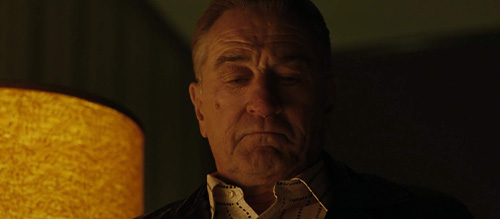The Irishman (2019) Review
The Irishman (2019)
Director: Martin Scorsese
Screenwriter: Steven Zaillian
Starring: Robert De Niro, Joe Pesci, Al Pacino, Stephen Graham, Anna Paquin, Ray Romano, Jesse Plemons, Harvey Keitel, Bobby Cannavale, Jack Huston
A thrilling, nostalgic and self-retrospective gangster movie from a directorial master of the form, The Irishman, based on the novel “I Heard You Paint Houses” by Charles Brandt, is epic in both run-time and contents, the superb control exerted upon the narrative’s scopious amounts of information by the great Martin Scorsese making for a truly extraordinary moment in American cinema in 2019.
Once Upon A Time in America… an indelible piece of the American way was the honourable gangster, and despite how great his movies were and have continued to be, the same holds true of the work of Scorsese, The Irishman signalling a return to the genre he moulded from the black and white of Classic Hollywood into a contemporary powerhouse through movies like Mean Streets, Goodfellas and The Departed. This revisitation, and his much anticipated reunions with Robert De Niro and Joe Pesci, make for a movie that in of itself must be considered a proverbial wave goodbye to the very figures that have made such an incomparable impact upon his work. In this respect, The Irishman feels like not only a retrospective on Scorsese himself, his gangster films or even the gangster genre as a whole, but as a loving last hurrah to the great and powerful work of his closest collaborators; Robert De Niro, Joe Pesci and Al Pacino offering truly exceptional work (in some cases for the first time in years) in this powerful film.
While The Irishman unfortunately doesn’t feature a sweeping score to the same exceptional levels of Ennio Morricone’s work on Sergio Leone’s American crime epic Once Upon a Time in America (1984), there are certainly similarities between the two projects, not least the epically scaled time-hopping sagas at the hearts of each of them.
Told over three distinct periods of lead character Frank’s (De Niro’s) life, with further flashbacks and flash-forwards included from time to time, The Irishman takes on an immediately difficult to navigate time frame and scale, but with Scorsese in the driving seat it never gets out of control. Scorsese, like the very best of directors from his era, has a particular affinity with re-purposing and re-analysing the mythos of Americana, and through this decades-spanning narrative is able to pass comment on monumental moments in American history such as the assassination of John F. Kennedy and the disappearance of Jimmy Hoffa.
This mythological exploration of course brings commentary on the “better” or “worse” ways of American life, but rather than leaning particularly hard in either direction, The Irishman seems to focus on creating a tangible representation of the sense of dread, regret and perhaps even nostalgia that comes with age or more notably death. It’s not that the picture is celebratory of ageing people or old age, more that it gives voice to the feeling of seeing life in all of its intricacies and all of its specifics quickly drain out of view. As much as it is a gangster film, and it truly is a gangster film, The Irishman is about the tragedy of time; the temporariness of life.
This is where the film’s notorious attempts to digitally de-age its lead actors came to take on more meaning than a simple party trick as, rather than casting different actors (as Leone did in OUATIA), the very purpose of de-ageing was intrinsic to the heart of The Irishman’s purpose, the casting being entirely appropriate for provoking our own senses of nostalgia and questions about age, what constitutes a person’s prime and so on.
The technique of de-ageing the central cast is, overall, particularly good. Though at first the effect is quite jarring – there always seems to be something about reflections, especially in the eyes, that they struggle to hit the bullseye with – it soon becomes utterly believable and (in the best way) entirely forgettable. There are some sequences that are well and truly remarkable in their digital artistry, and knowing that Scorsese was able to utilise this in a deep and artistic manner is truly a breath of fresh air.
De Niro is the actor most focused upon for this process, Pesci always playing an older man, and thankfully the CG didn’t detract from what was a tremendous performance. As the narrator, De Niro was the focus of the entire piece, his gravitas and monumental abilities coming to forge a character so strong that De Niro faded into Frank, an awards season push being sure to follow. Seeing the return of Joe Pesci to the big screen was also worth the wait, the legendary actor of Scorsese’s own Goodfellas bringing back the evil behind his eyes for a particularly impressive supporting performance. Pacino, although present less than his fellow cast members, was given a lot of scope to reproduce what we know and love of his more elaborate later work, but there are moments in The Irishman where the actor’s subtlety is truly gravitating, even scene stealing, making for a triumvirate of exceptional performances.
The Irishman is, then, a triumph in all aspects but particularly those of the filmmakers at its heart, this latest Scorsese film being an exceptional piece of cinema worth every second of its three and a half hour run-time and rumoured $200million budget – it seems Netflix were correct to put all their chips in on the project for a Best Picture Oscar because it certainly seems to be a front-runner.
In a world where Hollywood makes all of the industry’s money but it is international film taking the most extraordinary steps in the art-form, Scorsese has reminded us of the profoundly influential nature of American cinema in all of its artistic glory with the profound and quite spectacular The Irishman.
21/24


